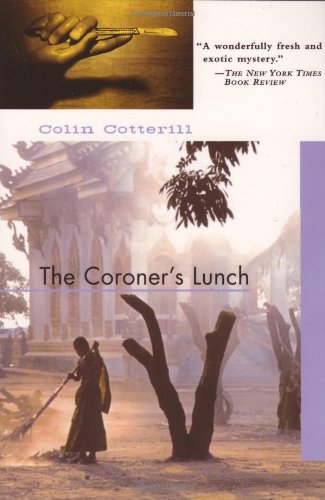 Laos is an impoverished, landlocked socialist republic in southeast Asia, bordering with the more dominant nations of China, Vietnam, Cambodia and Thailand. The Coroner’s Lunch is set in 1976, a year after the end of a long civil war that resulted in the Soviet-backed communist Pathet Lao coming to power.
Laos is an impoverished, landlocked socialist republic in southeast Asia, bordering with the more dominant nations of China, Vietnam, Cambodia and Thailand. The Coroner’s Lunch is set in 1976, a year after the end of a long civil war that resulted in the Soviet-backed communist Pathet Lao coming to power.
The protagonist of this wonderful book is Siri Paiboun, a doctor and a widower who, rather than being able to enjoy a peaceful retirement at the age of 72, is made the country’s only coroner. One of the many delights of this book about ordinary people’s experiences of living under the communist regime are the small everyday acts of subversion and rebellion that avoid the notice of the unimaginative authorities but cause a liberating sense of personal triumph that sustains people through each day.
Siri has been a communist ever since his student days in France, but only because of the woman he loved and subsequently married. Although perceived by the authorities as a safe pair of hands, Siri in fact is a detached observer of the soulless regime.
One of the many pleasures of this delightful novel is the life Siri has made in his hospital lab with his two co-workers: Drui, a spinster who reads out-of-date fashion magazines and looks after her ill mother; and Mr Geung, a man considered “simple” (he has Down’s syndrome). The collaboration and relationship between these three in their working and, occasionally, personal lives is a subtle yet sharp portrait of how the human spirit can prevail against the most deadening official dictates and the most extreme poverty of resources.
Turning to the actual plot, Siri is faced with two baffling and dangerous cases. One concerns Mrs Nitnoy, the wife of a senior government official, who has died mysteriously while at a Women’s Union meeting. Another concerns the bodies of three men who have been discovered at the bottom of the sea, tied to rusty bombshells. Siri’s professional attitude leads him to dig into these obscure deaths against the desires of officialdom to the extent of endangering himself. He also feels driven to continue because of his spiritual visitors and the final rest that will be brought to them by the knowledge of how they met their ends.
